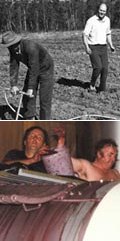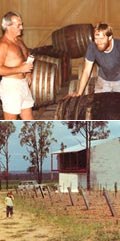


Brokenwood was founded by a trio of Sydney-based solicitors, Tony Albert, John Beeston and James Halliday, who paid a then record price of $970 per acre for a 10-acre block in the foothills of the Brokenback Ranges. The original block - originally planned as a cricket ground for the local community was planted with Cabernet Sauvignon and Shiraz.

The first vintage was picked in 1973. It was a labour of love for the partners, and the friends and families they conscripted to help, with the grapes being carried to the winery in buckets in the back seat of Len Evans' Bentley. Brokenwood's inaugural vintage yielded 75 dozen Shiraz - Cabernet. While none of the original partners claimed to know anything about viticulture, the wine received praise, and attracted a loyal following from its first vintage.
In 1975, a new winery was built to accommodate the growing production. The winery housed fermentation tanks and oak barrels, and, in dorm-style accommodation, the exhausted bodies of the many helpers who came to stay at Brokenwood, seduced by the promise of clean country air, fine food, wine and company in exchange for help on the vineyard. Visitors helped themselves to a taste of the very limited and eagerly sought after boutique wine made by Halliday and his band of weekend winemakers from a table standing in the shade of the first floor balcony.
Growth was steady until the boom of 1978, when six new partners joined, allowing the purchase of the next door Graveyard Vineyard. Designated as a cemetery by the local town planners, but never used as such, the block had been planted with Shiraz & Cabernet Sauvignon.

The heavy clay soil resulted in vintages of low yield, but with extraordinary concentration of flavour in the berries, providing a distinctive wine style that is still evident in the Brokenwood red wines.
The Graveyard Vineyard created Brokenwood's flagship wine, the Graveyard Vineyard Shiraz, which is still sourced exclusively from this one vineyard. The Langtons Classification of Distinguished Australian Wine has it as the highest rated Hunter Valley red wine, in the Outstanding category. In the same year, Brokenwood sourced fruit from outside the Hunter Valley for the first time - Cabernet Sauvignon from Coonawarra - which was blended with Hunter fruit to make a premium red.
In 1982, the company extended its range to include white wines - notably the jewel of the Hunter Valley, Semillon. With this broadened scope, the partners decided to consolidate further growth by appointing a Chief Winemaker/Managing Director. Iain Riggs joined Brokenwood in 1982, introducing new winery equipment and facilities specifically for premium white wine production. Brokenwood was now capable of producing high quality white wine, which, since 1983, has been a significant part of its total production.
The multi-regional blend wines, such as the popular Cricket Pitch range, are sourced from premium regions throughout Australia to create a style that demonstrates balance, elegance and consistency. While the size of the company has grown, the operation remains deliberately labour intensive, being the only way of assuring the individuality of the wines.
